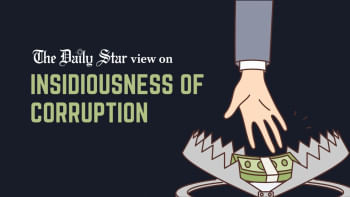Another day, another scandal in public procurement

It is shocking to learn of an astonishing disclosure that has recently come to the fore: that the state-run Power Grid Company of Bangladesh LTD (PGCBL) imported 68 kilograms of tower bolts, nuts and washers from India for a colossal $2,39,695—about 1,619 times more than their contract value—in 2023. Reportedly, as per the purchase agreement that PGCBL submitted to the customs authorities, the actual price of the consignment should have been only $148. Customs officials halted the consignment's release after spotting the huge discrepancy once it reached Mongla port in April last year.
Earlier, the PGCBL had imported 178.8 tonnes of the same goods at a cost of $3,89,252 ($2.18 per kg), according to customs documents. The state company, on June 5 last year, wrote to the Mongla Customs House commissioner that the price was higher this time even though the import volume was less because "more goods were sent by mistake in the previous shipment." As the PGCBL failed to provide a satisfactory reply regarding the inflated price and submit relevant documents such as LCs and invoices of two previous consignments, the Mongla Customs House refused to release it and sought the NBR's opinion about the matter. What is interesting is that, having failed to have the items released in various ways, the power supplier is now seeking to send back the items on the pretext of a "human error" in paperwork.
The whole episode reeks of corruption, and the regulators should immediately investigate whether any attempt was made to launder money under the pretext of importing goods, and individuals involved in it. Even the Mongla Customs commissioner in a letter to the NBR said "the statement of the importer that the consignment was carelessly sent to a wrong destination is untrue." The PGCBL incident has been revealed at a time when corruption in public procurement, often using inflated rates, has become widespread. Over the years, we have come across many reports on similar attempts to import overpriced items by various government bodies.
Money laundering under the guise of import/export has also emerged as a huge problem for the country, draining our coffers in the process. Irregularities in public-sector procurement in particular has become common thanks in part to the authorities' failure to hold those responsible to account. Government high-ups, however, still continue to promise prevention of wastage of resources through public procurement and project expenditure, while doing little about investigating and punishing officials involved in such clear cases of corruption. We urge the authorities to make an urgent course correction.


 For all latest news, follow The Daily Star's Google News channel.
For all latest news, follow The Daily Star's Google News channel. 










Comments